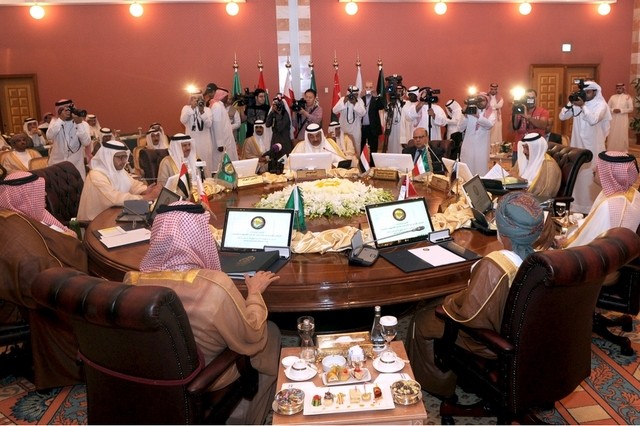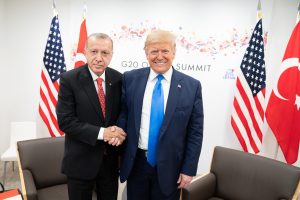by Thomas W. Lippman
Throughout the Middle East, television news broadcasts on state-owned channels have always featured what Western journalists ridicule as “coming and going stories”—a delegation from some country or organization arrives, the delegation meets the king or president, the delegation goes home, perhaps after issuing a bland statement that reveals little about what was discussed.
There have been quite a few of these over the past ten days, but some have been more intriguing than usual. Taken together, they hint at progress in the effort by the United States and its friends to assemble what is known as a “coalition of the willing” to confront the threat from the Islamic State (ISIS).
“Coalition of the willing” may be too generous a description; it’s more a “coalition of the have no other choices.” ISIS, the enemy of pretty much everyone in the neighborhood, seems to be bringing together countries that otherwise have deep differences and longstanding grudges.
This is what Secretary of State John F. Kerry was talking about in an op-ed he published over the weekend in the New York Times. It didn’t attract much attention because it was a holiday weekend and the chattering classes were preoccupied with President Obama’s “We don’t have a strategy yet” gaffe, but in fact Kerry laid out an ambitious plan to forge a broad coalition against ISIS and develop a plan of action. He said he and Defense Secretary Chuck Hagel will go to the region this week to pursue it, and the United States will use its presidency of the UN Security Council this month for Obama to convene “a summit meeting of the Security Council to put forward a plan to deal with this collective threat.”
Judging from the regional “comings and goings” of recent days, the atmosphere may be more receptive. In particular, there were signs that Saudi Arabia and Qatar may be able to put aside their many differences, or at least not interfere with each other, in the face of the ISIS threat.
On Aug. 24, for example, according to the official Saudi news agency, the foreign ministers of Saudi Arabia, Qatar, the United Arab Emirates, Jordan and Egypt met in Jeddah to talk about the war in Syria to discuss the Syrian conflict and other “challenges, including the rise of terrorist extremist ideology.” In an official statement, they expressed their agreement on “the need to seriously work to deal with these crises and challenges to preserve security and stability in Arab countries.”
The next day a senior official of the Iranian foreign ministry was in Saudi Arabia to see the foreign minister, Prince Saud al-Faisal. Little was said officially, but the fact that it happened was important by itself. Saudi Arabia and Iran have long had frosty relations over many regional issues, including Iran’s support for Syria’s president, Bashar al-Assad, whom the Saudis have pledged to overthrow.
After that, Prince Saud, accompanied by Interior Minister Prince Mohammed bin Nayef and the head of Saudi intelligence, went to Doha on what the official news agencies called a “short brotherly visit.” That did not stop the attacks on Qatar in the Saudi media—Salman Aldossary, the editor in chief of the Saudi-owned Al Sharq al Awsat wrote that “the Gulf states can no longer tolerate Doha’s often rebellious policies toward its neighbors. What is also clear is that Qatar can no longer do anything to gloss over its mistakes in this regard”—but it cleared the way for a meeting of the foreign ministers of all six countries of the Gulf Cooperation Council (GCC) at the end of August.
The foreign ministers of Saudi Arabia, Bahrain, Kuwait, Oman, the United Arab Emirates and Qatar issued a joint statement condemning “terrorist groups in Iraq and Syria,” and proclaiming their “firm stances to renounce terrorism and extremism in all its forms and manifestations, whatever its motives and justifications and whatever its source.” They also cited “the importance of cooperation relations between the GCC countries and Iran, based on respecting the sovereignty of countries in the region, non interference in their internal affairs, principles of good neighborhood and refrain from use or threat of force.”
The communiqué said nothing about the fact that Saudi Arabia, Bahrain and the UAE were so angry at Qatar last spring that they pulled out their ambassadors and have not sent them back, nor did it say anything the prime cause of that anger, Qatar’s support for the Muslim Brotherhood, which Saudi Arabia and Egypt have branded a terrorist organization—but some accommodation may be under discussion. Kuwaiti Foreign Minister Sheikh Sabah al-Khaled said the six countries are eager to work out their differences and overcome the “pain” their disagreements have caused.
This week Saudi Arabia’s defense minister, Prince Salman bin Abdul Aziz, has been in Paris to finalize a deal in which the kingdom will pay for French weapons to be supplied to the army of Lebanon, which faces the threat of jihadist extremists coming across the border from Syria. And Germany announced it would supply machine guns, anti-tank missiles and armored vehicles to the Kurdish forces known as peshmerga, who are battling ISIS in Northern Iraq.
This is what Kerry meant when he wrote that “In this battle, there is a role for almost every country. Some will provide military assistance, direct and indirect. Some will provide desperately needed humanitarian assistance for the millions who have been displaced and victimized across the region. Others will help restore not just shattered economies but broken trust among neighbors…. ISIS’ abhorrent tactics are uniting and rallying neighbors with traditionally conflicting interests to support Iraq’s new government. And over time, this coalition can begin to address the underlying factors that fuel ISIS and other terrorist organizations with like-minded agendas. Coalition building is hard work, but it is the best way to tackle a common enemy.”
Photo: The foreign ministers of the GCC meet in Jeddah, Saudi Arabia, on Aug. 30, 2014. Credit: WAM






Such a coalition would be more effective and encourage a broader regional rapprochement if Syria and Iran were also included, something that Russia has urged, but the Administration seems to have discouraged. Frankly, if the region were at peace, it could get down to the business of business, and building long term stability through trade and cross border investment that met the needs and interests of all of the countries in the region.
There is no reference to Turkey.
What does that tell us?
What good does it do if the financial backers continue supporting ISIS? It’s like every other jihad group created, they grow, then they become the enemy. I wonder, what the M.E. would look like today if the U.S. stayed out of there from the very beginning? Death and destruction, seems to go hand in hand, along with failure.
Isn’t ISIS being supported by Saudi Arabia and Qatar, the same people who supposedly are now shaking in their boots? Why not just cut off the flow of money? Totally confused.
Why there’s even some talk that if the US strikes at ISIS in Syria there should also be strikes against Assad as well because you don’t want to give him a leg up in his fight against ISIS even though we now consider ISIS our biggest threat and we need all the help we can get. Again totally confused.
But that confusion starts go away when you realize there’s a school of thought going around is all this huffing and puffing over ISIS is just posturing, and the real target is Assad.
Just because the ISIS Frankenstein monster created by Washington with it cohorts in the Gulf broke its leach and now has to be reeled back in, that is no reason why Empire will stop using cheap and highly motivated Jihadhis as mercenaries to achieve its Geo Political goals.
Yes Jhadhis are hard to control once they get their hands on an oil well or two and have independent financing.
But Washington doesn’t have the political capital to put boots on the ground in sufficient numbers, and bad help has so far been better than no help, in blowing up the Levant to re-map it to suit Empire’s tastes.
Iraq will not prove much of a problem as ISIS will be contained there. But they may have a problem in Damascus.
It is entirely unclear that with Russian and Iranian money Assad cannot hold ISIS off.
But if he runs into trouble Washington will have to help or wind up with a Muslim Brotherhood government or worse in Damascus, which would be an existential threat to little brother Israel as it will link up with Hamas and the oppressed Egyptian people.
The rest is political BS, as to how Washington intends to sell this ball of wax to their sheeple,
Of course there will be lots of high profile “meetings” where everyone sits around in luxury hotels on the public dime saying what is completely obvious, while reporters furiously write down every silly word.
Hasn’t it always been that way?